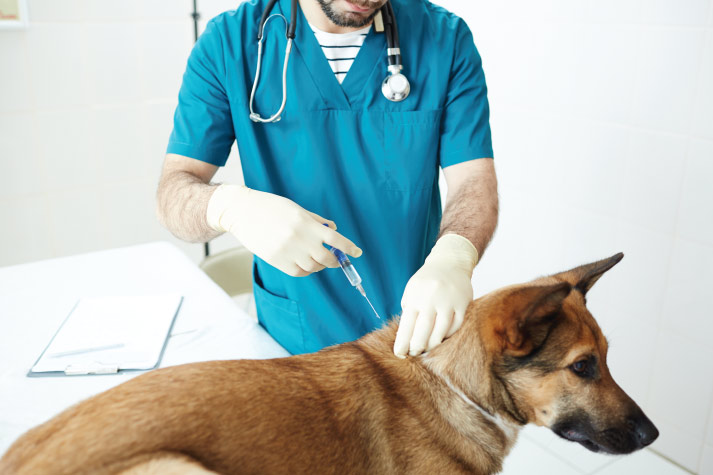
20 Mar
Vaccination Schedule for Dogs: A Comprehensive Guide to Immunizations
Vaccinations are a simple, inexpensive, and effective way of preventing diseases. They use a body’s natural immune system to generate a response against diseases and build immunity & protection. Vaccinations are as important for our pets as they are for us, as timely vaccinations help boost your pet’s immunity and protect them against deadly and sometimes infectious diseases. Since no pet parent wants their baby to ever fall ill, vaccinations are an essential part of pet ownership.
Here Is a Comprehensive Guide to Your Pet’s Vaccinations
Why are Vaccines Important for Pets?
Vaccinations ensure your pup is protected against harmful and dangerous pathogens. During their infancy, puppies usually get their immunity from their mother's milk. However, this protection does not last forever, which means you'll need to strengthen your pet's immune system to maintain health. This is where vaccinations come in, as they help strengthen your pup's immune system and provide protection against infectious diseases into adulthood.
Vaccinations prepare your pet's immune system to recognize and eliminate pathogens. Vaccination will help your pet's immune system recognize, engage, and eliminate the presence of pathogens, but the key difference is longevity, wherein the protection from vaccinations will remain intact provided the correct booster doses are provided and protect your pet for months or even years.
Vaccinations are also necessary for registration, compliance, and pet travel purposes. For instance, if you're planning for an international pet relocation, you will require vaccinations to comply with their import laws; vaccinations also prevent the spread of dangerous zoonotic diseases. Vaccinations are also required for pet registration across various states in different countries worldwide. For example, most Indian states now require pets to be registered with their local municipality, which requires the core vaccinations to be completed. This helps prevent the spread of diseases from stray to pet dogs and helps curb the spread of disease in general. A guaranteed vaccination will help you avoid a process like rabies titer testing, which ccan be costly and cumbersome.
When Should I Vaccinate My Dog?
Puppies generally receive their first vaccinations at roughly 6-8 weeks of age. The exact schedule depends on the recommendations made by a vet and the exact situation of your pup. Booster doses are usually given every 2-4 weeks until your puppy is at least 4 months old. Depending on where you live and what vaccinations your dog has received, other booster doses may be required annually to maintain the same level of immunity.
What Diseases Do Vaccinations Prevent?
Vaccinations prevent a host of diseases in dogs, both at the puppy stage and during adulthood. Both puppies and adult dogs receive a primary dose of a vaccine to ensure protection. Depending on whether you’ve bought/adopted your dog, how old they are,
Here are the primary doses of vaccines administered to puppies and adult dogs:
| Vaccine | Primary Dose Puppy | Primary Dose Adult |
| Distemper | 3 doses, 2-3-4 months | 2 doses, 3-4 weeks apart |
| Adenovirus – 2 | 3 doses, 2-3-4 months | 2 doses, 3-4 weeks apart |
| Parainfluenza | 3 doses, 2-3-4 months | 2 doses, 3-4 weeks apart |
| Bordetella Bronchiseptica | 3 doses, 6-9-12 weeks | 2 doses, 3-4 weeks apart |
| Parvovirus | 3 doses, 2-3-4 months | 1 dose |
| Lyme Disease (Borrelia burgdorferi) | Two doses: 12th and 15th week | 2-3 doses 3 weeks apart |
| Corona Virus | Begins at 6 weeks & every 3 weeks until 12 weeks of age | 2-3 doses 3 weeks apart |
| Giardia | 8th and 11th week | 2-3 doses 3 weeks apart |
| Leptospirosis | 8th and 11th week | 2-3 doses 3 weeks apart |
| Rabies | 3 months of age | 1 dose |
Do Dog Vaccinations Have Side Effects?
For the most part, dog vaccinations do not have side effects. Vaccinations are generally safe and require no extra care, but in rare cases, some puppies may experience some mild side effects:
- Lethargy
- Loss of appetite
- Fever
- Swollen paws
- Vomiting
Such side effects are visible in rare cases. If you do notice any side effects shortly after getting your dog a vaccination, contact your vet immediately; they can confirm if the side effect is a commonly known occurrence to a particular vaccination or if your pet requires attention and care.
Are All Vaccinations Necessary for My Dog?
The simple answer to this is both yes and no. Yes, your dog should receive the primary or core group of vaccinations, as these vaccines protect against common and eventually dangerous diseases, and no, not every single vaccination is mandatory for your pet. However, the non-core group of vaccinations may be necessary, depending on your puppy’s lifestyle, and factors such as their exposure to outdoor environments, their daily routines, and their frequency of interaction with other pet & stray dogs. Therefore, while every dog should be given the core group of vaccinations, the non-core vaccines may only be required if your dog has a lifestyle that warrants them Consult your vet to decide on the best vaccination plan for your puppy.
To conclude, vaccinations are a simple, effective, and inexpensive way of protecting your pet from harmful diseases. They help your dog stay healthy, they offer long-term protection, and they act as a preventive measure by ensuring no animal-to-human disease transmission takes place, which is why they are often a requirement for international pet relocations and registration/certification. As long as you make sure your dog receives their core group of vaccinations after consulting a vet, you should have no trouble maintaining your pet's health.






AUTHOR’S BIO
Carry My Pet
Passionate pet enthusiasts and globetrotters, dedicated to easing furry friends' journeys worldwide. Penning tales of compassion at CarryMyPet, where every relocation is a tail-wagging adventure.